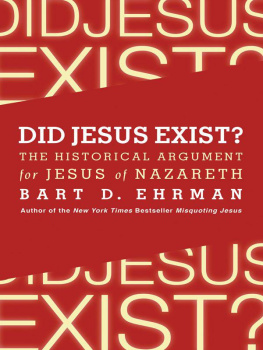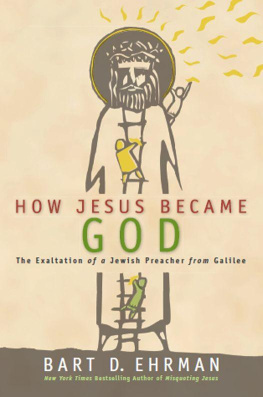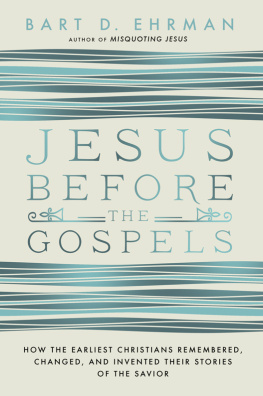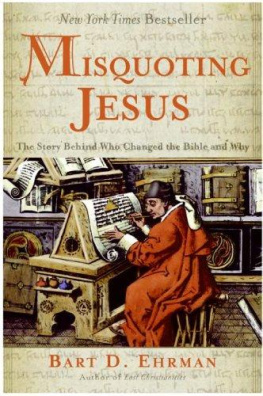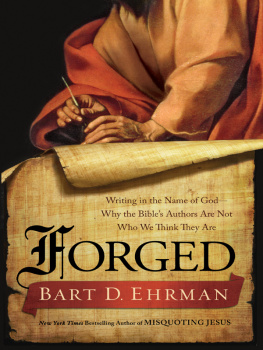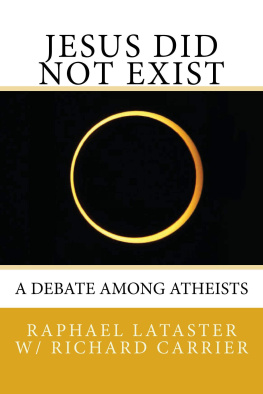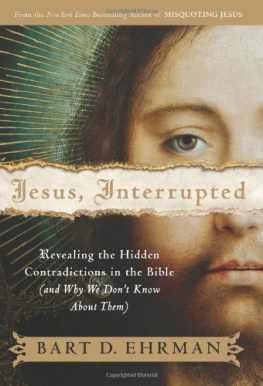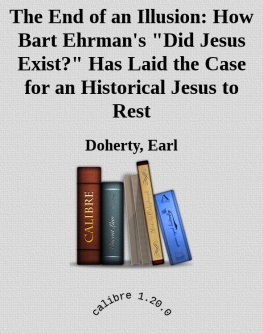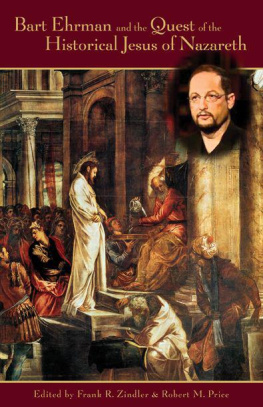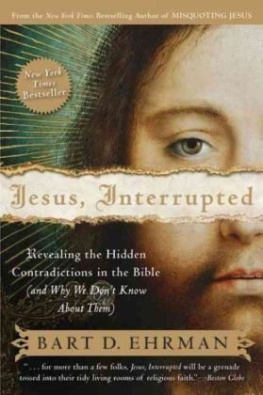Bart D. Ehrman
Contents
Evidence for the Historical Jesus
An Introduction to the Mythical View of Jesus
Non-Christian Sources for the Life of Jesus
The Gospels as Historical Sources
Evidence for Jesus from Outside the Gospels
Two Key Data for the Historicity of Jesus
The Mythicists Claims
The Mythicist Case: Weak and Irrelevant Claims
Mythicist Inventions: Creating the Mythical Christ
Who Was the Historical Jesus?
Finding the Jesus of History
Jesus the Apocalyptic Prophet
Jesus and the Mythicists
F OR THE PAST SEVERAL years I have been planning to write a book about how Jesus became God. How is it that a scarcely known, itinerant preacher from the rural backwaters of a remote part of the empire, a Jewish prophet who predicted that the end of the world as we know it was soon to come, who angered the powerful religious and civic leaders of Judea and as a result was crucified for sedition against the statehow is it that within a century of his death, people were calling this little-known Jewish peasant God? Saying in fact that he was a divine being who existed before the world began, that he had created the universe, and that he was equal with God Almighty himself? How did Jesus come to be deified, worshipped as the Lord and Creator of all?
I have to admit that I am eager to write the book, as these are among the most pressing questions in the entire history of religion. But I have continually been forced to put the book off as other writing projects have taken precedence. It will, however, be my next book. In the meantime, something more pressing has come up, a prior question that I have to address first. This book deals with that prior question.
Every week I receive two or three e-mails asking me whether Jesus existed as a human being. When I started getting these e-mails, some years ago now, I thought the question was rather peculiar and I did not take it seriously. Of course Jesus existed. Everyone knows he existed. Dont they?
But the questions kept coming, and soon I began to wonder: Why are so many people asking? My wonder only increased when I learned that I myself was being quoted in some circlesmisquoted ratheras saying that Jesus never existed. I decided to look into the matter. I discovered, to my surprise, an entire body of literature devoted to the question of whether or not there ever was a real man, Jesus.
I was surprised because I am trained as a scholar of the New Testament and early Christianity, and for thirty years I have written extensively on the historical Jesus, the Gospels, the early Christian movement, and the history of the churchs first three hundred years. Like all New Testament scholars, I have read thousands of books and articles in English and other European languages on Jesus, the New Testament, and early Christianity. But I was almost completely unawareas are most of my colleagues in the fieldof this body of skeptical literature.
I should say at the outset that none of this literature is written by scholars trained in New Testament or early Christian studies teaching at the major, or even the minor, accredited theological seminaries, divinity schools, universities, or colleges of North America or Europe (or anywhere else in the world). Of the thousands of scholars of early Christianity who do teach at such schools, none of them, to my knowledge, has any doubts that Jesus existed. But a whole body of literature out there, some of it highly intelligent and well informed, makes this case.
These sundry books and articles (not to mention websites) are of varying quality. Some of them rival The Da Vinci Code in their passion for conspiracy and the shallowness of their historical knowledge, not just of the New Testament and early Christianity, but of ancient religions generally and, even more broadly, the ancient world. But a couple of bona fide scholarsnot professors teaching religious studies in universities but scholars nonetheless, and at least one of them with a Ph.D. in the field of New Testamenthave taken this position and written about it. Their books may not be known to most of the general public interested in questions related to Jesus, the Gospels, or the early Christian church, but they do occupy a noteworthy niche as a (very) small but (often) loud minority voice. Once you tune in to this voice, you quickly learn just how persistent and vociferous it can be.
And the voice is being heard loud and clear in some places. Even a quick Internet search reveals how influential such radical skepticism has been in the past and how rapidly it is spreading even now. For decades it was the dominant view in countries such as the Soviet Union. Yet more striking, it appears to be the majority view in some regions of the West today, including some parts of Scandinavia.
The authors of this skeptical literature understand themselves to be mythiciststhat is, those who believe that Jesus is a myth. Rarely do mythicists define what they mean by the term myth, a failure that strikes real scholars of religion as both unfortunate and highly problematic, since in technical scholarship the term has come to mean many things over the years. When mythicists use the term they often seem to mean simply a story that has no historical basis, a history-like narrative that in fact did not happen. In this sense Jesus is a myth because even though there are plenty of ancient stories told about him, they are not historical. His life and teachings were invented by early storytellers. He never really lived.
Those who do not think Jesus existed are frequently militant in their views and remarkably adept at countering evidence that to the rest of the civilized world seems compelling and even unanswerable. But these writers have answers, and the smart ones among them need to be taken seriously, if for no other reason than to show why they cannot be right about their major contention. The reality is that whatever else you may think about Jesus, he certainly did exist. That is what this book will set out to demonstrate.
I hardly need to stress what I have already intimated: the view that Jesus existed is held by virtually every expert on the planet. That in itself is not proof, of course. Expert opinion is, at the end of the day, still opinion. But why would you not want to know what experts have to say? When you make a dental appointment, do you want your dentist to be an expert or not? If you build a house, do you want a professional architect or your next-door neighbor to draw up the plans? One might be tempted to say that in the case of the historical Jesus it is different since, after all, we are just talking about history; experts have no more access to the past than anyone else. That, however, is simply not true. It may be the case that some of my students receive the bulk of their knowledge of the Middle Ages from Monty Python and the Holy Grail, but is that really the best place to turn? So too millions of people have acquired their knowledge about early Christianityabout Jesus, Mary Magdalene, the emperor Constantine, the Council of Nicaeafrom Dan Brown, author of the aforementioned The Da Vinci Code. But at the end of the day, is that such a wise choice?
Serious historians of the early Christian movementall of themhave spent many years preparing to be experts in their field. Just to read the ancient sources requires expertise in a range of ancient languages: Greek, Hebrew, Latin, and often Aramaic, Syriac, and Coptic, not to mention the modern languages of scholarship (for example, German and French). And that is just for starters. Expertise requires years of patiently examining ancient texts and a thorough grounding in the history and culture of Greek and Roman antiquity, the religions of the ancient Mediterranean world, both pagan and Jewish, knowledge of the history of the Christian church and the development of its social life and theology, and, well, lots of other things. It is striking that virtually everyone who has spent all the years needed to attain these qualifications is convinced that Jesus of Nazareth was a real historical figure. Again, this is not a piece of evidence, but if nothing else, it should give one pause. In the field of biology, evolution may be just a theory (as some politicians painfully point out), but it is the theory subscribed to, for good reason, by every real scientist in every established university in the Western world.

